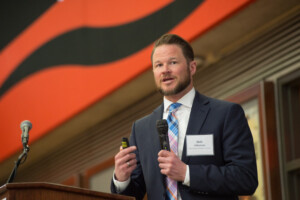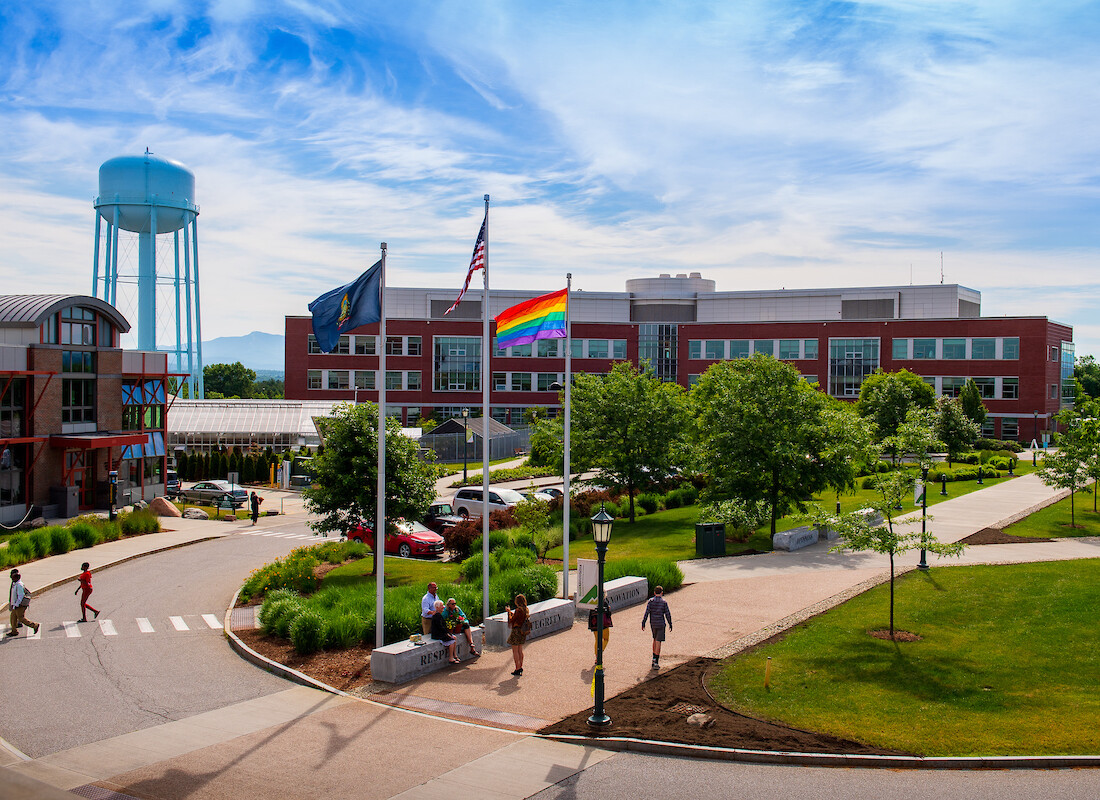By Kate Whitney
Higher education is one of the most heavily regulated sectors in the United States, with a diverse and ever-changing roster of legal issues competing for attention.
In spite of these challenges, Seth Gilbertson, Associate Counsel for the State University of New York’s Office of University Counsel, was thrilled when he was offered a position at SUNY 12 years ago.
“Institutions of higher education tend to be a proving ground or a test tube for a lot of cutting edge and old concepts of law, whether they be first amendment or due process or equal protection,” Gilbertson explained. “Some of the biggest ideas and the most important constitutional concepts tend to play out in higher education. In the same way that colleges and universities can be an area for growth and experimentation, learning and pushing the boundaries in terms of students getting educated and doing research, our students and our professors and researchers all tend to push the boundaries in ways that push the law in new ways. College and universities tend to be a bit more risk-tolerant and experimental than the for-profit private sector or traditional public entities like agencies or municipalities.”

This year marks Gilbertson’s tenth appearance at UVM’s Legal Issues in Higher Education Conference, but his first year as a member of the Conference Advisory Board. A featured presenter at past conferences, Gilbertson is acting as a facilitator for four presentations on International Risk Management and Compliance, Accommodating Students with Disabilities off Campus, Digital and Web Accessibility, and, lastly, an OCR Update, which will feature guest speaker Debbie Osgood, former Regional Director of the Office of Civil Rights, who will address the leadership transitions at OCR as well as procedural changes.
“She’s a fantastic resource,” Gilbertson said. “The work that OCR does is so important and so impactful on institutions of higher education. The more we know about their priorities and their inner workings and what they are facing and what they’re trying to get us to do, the better we can make that vital relationship between us and them.”
Tackling Legal Challenges on- and off-Campus
As colleges and universities strive for a larger international presence, issues that were once limited to campus can go global.
“Just because students are a world away doesn’t mean that the issues like mental health and student conduct can’t arise,” Gilbertson said. “And the university has an obligation to address those issues despite the borders or oceans that may lie between the campus and the student.”
Gilbertson said the advisory board is excited to have William Hoye, Executive Vice President, Chief Operating Officer and General Counsel at IES Abroad, speaking on the topic of International Risk Management and Compliance at this year’s conference, and whose presentation is expected to include how to apply the campus judiciary systems and maintain Title IX responsibilities abroad.
“Oftentimes, there are just one or two leaders on a trip with 20 students so if there’s a major incident on the conduct front, it can disrupt everybody’s educational experience,” Gilbertson said. “And this is just one kind of thing that can come up. We have to consider health emergencies, travel emergencies, political unrest, tsunamis, volcanoes, earthquakes—all kinds of things happen when students are traveling and we kind of need to be ready to handle everything.”
According to Gilbertson, another area of growing importance in higher education law is that of accessibility for students with disabilities off campus—ensuring that every student has the ability to fully participate in all aspects of their college experience, from international travel with their professors and peers to internships, clinical rotations, and student teaching opportunities.
“There are a number of challenges that can come up depending on the type of program and an individual student’s particular disability,” Gilbertson stated. “Trying to keep our programs flexible, making sure that the people leading the programs know what they’re doing and are understanding the needs of the students that are going, and to some extent, trying to make sure that students are in the right programs that allow us to give them the best experiences.”
Creating Equal Access for All
Tailoring programs to meet individual needs is one thing. Striving for equal access becomes more complicated when addressing the challenges of digital and web accessibility.
“University websites are so big and there’s so much information,” Gilbertson said. “Every department and every division has their own web person that’s uploading information and changing and reorganizing things and trying to keep all that together and make sure those people are trained and have the tools that they need—that’s a big undertaking. And there’s not as much expertise out there as we would like.”
“There was a lot of OCR activity on this in the last few years,” Gilbertson continued. “So we’ve been working hard on that. There’s been a lot of litigation and people in different communities asking us to do a better job at meeting their needs. One of the difficult areas we encounter with web accessibility is that it’s not just a student coming to us, saying I need this accommodation based on this disability, and then we just craft it to meet that student’s needs. We need to be ready to meet everybody’s needs all the time because you never know who’s going to come to your website and check out your course catalogue or read about some research in your school of engineering or check the score from last night’s football game. You have to be ready and constantly accommodating for all potential visitors rather than making specific accommodations for specific students, like we do in our programs.”
In addition to these topics, Gilbertson expects trending issues such as the political and economic climate, U.S. Foreign Policy and Relations, and changes to the immigration system and its impact on students, faculty, and staff to play major roles at this year’s Legal Issues conference, but he sees the three-day event as an incredible opportunity to make headway on the challenges faced by colleges and universities.
“I think one of the great virtues of our sector, higher education, is our willingness to cooperate and share expertise and knowledge with each other,” Gilbertson said. “This conference is a great opportunity to do that. You don’t find many sectors that share and cooperate as well as we do, and as much as we do, and as freely as we do. Although we are often competitors, if you walk into that conference on any morning, you look around and see a bunch of colleagues and friends, trying to help each other out and learn from each other and do better. That’s one of the great things about higher education and one of the great things about the conference.”
The 2019 Legal Issues in Higher Education Conference is set for October 14-16 at UVM’s Davis Center. The conference also offers a web live streaming registration option.
Registration is now open.




